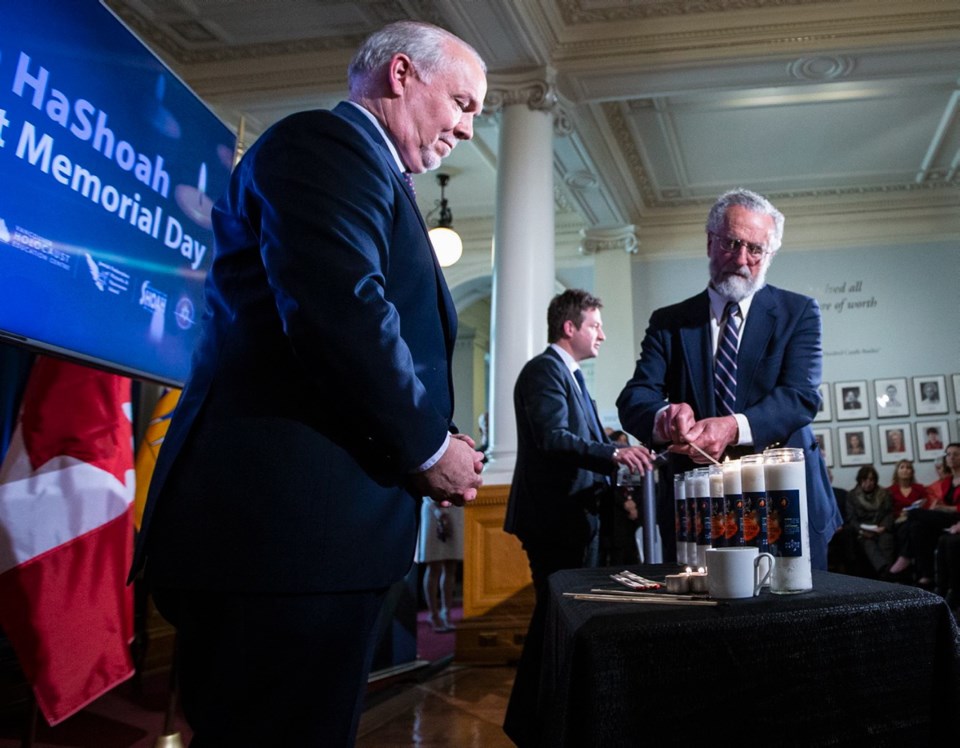With anti-Semitism and hate crimes on the rise in Canada, Victoria Holocaust survivor Julius Maslovat says it’s more important than ever to remember the systematic slaughter of six million Jews during the Second World War in order to prevent it from ever happening again.
The 77-year-old was one of six Holocaust survivors who lit candles during Yom Ha’Shoah or Holocaust Remembrance Day, which was marked at the B.C. legislature on Thursday.
Six were lit for the six million Jews murdered during the Holocaust, with yellow wax representing the yellow arm bands Jews were forced to wear. A seventh was lit to remember other marginalized groups killed by the Nazis, including Roma people, people persecuted for their sexual orientation and people with disabilities.
The most powerful tool in combating intolerance and hate is education, Maslovat said.
“We cannot legislate tolerance — it has to come from within and the way it comes from within is through education,” he said. “The way that survivors can complement that is by talking to students, talking to the general public and telling their stories and making it real to them that it has happened on an individual basis.”
Maslovat was just under three when the Buchenwald concentration camp was liberated. It was one of the largest in Germany and the scene of 56,000 deaths.
By then, his entire family had been snatched from him. His father died at the Nazi death camp, while his mother had been killed at the Treblinka concentration camp when he was four months old.
Maslovat doesn’t remember his parents, but he has a vivid memory of being in an open cattle cart. He believes that was the last time he saw his father.
“Because I was so young, I didn’t have any control of the situation,” he said.
Maslovat says he survived thanks to luck and the people who took care of him in the concentration camp until it was liberated by the U.S. Army in 1945. Maslovat was taken to Sweden, where he recovered from tuberculosis and was adopted by a Finnish Jewish couple. Maslovat moved to Canada in 1966 and Victoria in 1998.
Premier John Horgan and Education Minister Rob Fleming both urged British Columbians not to become complacent in the face of rising incidents of hate, xenophobia and anti-Semitism. It’s important to confront the apathy and indifference that played a role in allowing so many Jews to be killed, Fleming said, including Jewish refugees who were turned away at Canada’s borders.
According to a report released this week by the League for Human Rights, the advocacy branch of the Jewish organization B’nai Brith Canada, there were 2,041 reported hate crimes against Jewish Canadians in 2018, a 16.5 per cent increase from the year before.
“Today, we are seeing an alarming rise in anti-Semitic incidents in Canada,” Fleming said, adding that the hate often starts with vitriolic posts on social media. “It is a moral imperative for all of us to fight xenophobia and prejudice wherever we see it. With fewer Holocaust survivors still alive to tell their stories, it’s more critical than ever that we pass on these lessons to future generations.”
Last week, a gunman opened fire on worshippers marking the last day of Passover at a synagogue in Poway, California, killing one and injuring three. Prosecutors have called the attack a hate crime. It happened six months after a man killed 11 people and wounded seven others at a Pittsburgh synagogue, the deadliest act of anti-Semitic violence in American history.
Horgan referenced those hate crimes as well as other attacks against religious groups, including the Easter Sunday bomb attacks on Christians in Sri Lanka, and the March 15 mass shooting that killed 50 Muslims in two mosques in New Zealand.
“We need to remember that if we do not stand together — Christians, Jews, Muslims, those who have no faith at all — if we do not stand together when hate raises its head, we will have failed not only those who lost their lives so many decades ago, in the millions, but those who will come after us,” Horgan said.
“On this Yom Ha’Shoah, we must always remember that in the presence of those who survived those horrors, today we stand with you, tomorrow we still stand with you and forever we will remember the impacts of your lives and the consequences that you have lived for so many decades now.”
Maslovat shared Horgan and Fleming’s concern about the rise in hate crimes and discrimination.
“Yes, things are getting worse,” Maslovat said. “What we have to teach children is not to bully, to take care of each other, to make friends with people who are different than us. To invite them for dinner. And to make sure that we see the difference, but we also see the commonality between us.”



